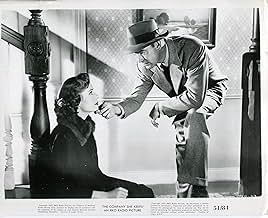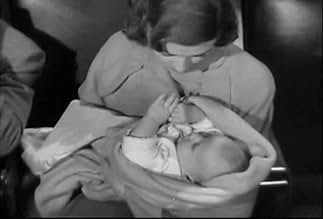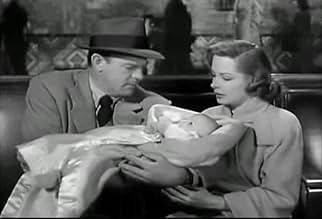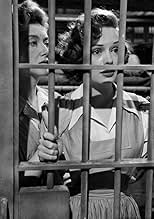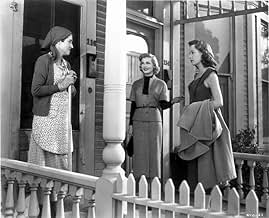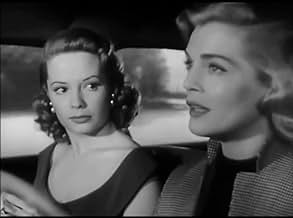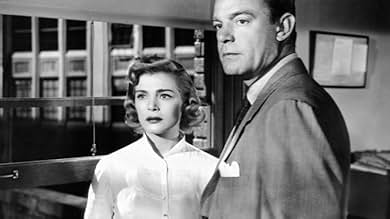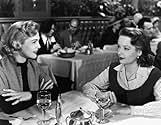अपनी भाषा में प्लॉट जोड़ेंA female ex-convict meets a handsome man and they start dating, but she jeopardizes their relationship by not telling him that she was in prison--and he doesn't reveal his involvement with h... सभी पढ़ेंA female ex-convict meets a handsome man and they start dating, but she jeopardizes their relationship by not telling him that she was in prison--and he doesn't reveal his involvement with her parole officer.A female ex-convict meets a handsome man and they start dating, but she jeopardizes their relationship by not telling him that she was in prison--and he doesn't reveal his involvement with her parole officer.
Eric Alden
- Sergeant of Detectives
- (बिना क्रेडिट के)
Parley Baer
- Steve
- (बिना क्रेडिट के)
Larry Barton
- Store Detective
- (बिना क्रेडिट के)
June Benbow
- Myrtle
- (बिना क्रेडिट के)
Lela Bliss
- Window Shopper
- (बिना क्रेडिट के)
Gail Bonney
- Nurse
- (बिना क्रेडिट के)
फ़ीचर्ड समीक्षाएं
This film does not fall short by any means. The Company She Keeps is a story of a young woman's plight named Diane Stuart (played by Jane Greer) that lands her behind bars on more than one occasion and when the opportunity for parole arises she has developed such a defeatist attitude that she feels she is fighting everyone in the (in)justice system. If Diane did not have bad luck she would have no luck at all. Once out of prison she visits with her parole officer Joan Willburn (played by Lizabeth Scott) and by accident or intention Diane finds the man of her dreams a newspaper columnist named Larry Collins (played by Dennis O'Keefe).
The three main characters in this film, Diane Stuart (ex-con), Joan Wilburn (parole officer), and Larry Collins (newspaper columnist) form the love triangle that has deception written all over this screen play. Lies, lies, lies, or is it just that each person is reluctant to hurt the others feelings?
As the film progresses we the audience realize that even female paroled prisoners are still considered ex-cons and their life is subjected to hell, especially in the year 1951 which is when this film was released. Truth be told, the rights and freedoms of ex- cons has not progressed much over the past 70 odd years.
Inevitably Diane finds herself in a police line-up once again for nothing at all and she realizes her life is crap and any chance of true love, life and freedom was nothing more than a pipe dream.
I won't spoil the film for anyone, but I will say that the director John Cromwell provided the audience with a surprise ending that should make most of his audience leaving the movie theater with a lot to talk about. The performances of Lizabeth Scott, Jane Greer, and Dennis O'Keefe were top notch. After close to 70 years since the films release I felt the film still contains a lot of human interest as it relates to crime and punishment.
I give the film 4**** of 5*****.
The three main characters in this film, Diane Stuart (ex-con), Joan Wilburn (parole officer), and Larry Collins (newspaper columnist) form the love triangle that has deception written all over this screen play. Lies, lies, lies, or is it just that each person is reluctant to hurt the others feelings?
As the film progresses we the audience realize that even female paroled prisoners are still considered ex-cons and their life is subjected to hell, especially in the year 1951 which is when this film was released. Truth be told, the rights and freedoms of ex- cons has not progressed much over the past 70 odd years.
Inevitably Diane finds herself in a police line-up once again for nothing at all and she realizes her life is crap and any chance of true love, life and freedom was nothing more than a pipe dream.
I won't spoil the film for anyone, but I will say that the director John Cromwell provided the audience with a surprise ending that should make most of his audience leaving the movie theater with a lot to talk about. The performances of Lizabeth Scott, Jane Greer, and Dennis O'Keefe were top notch. After close to 70 years since the films release I felt the film still contains a lot of human interest as it relates to crime and punishment.
I give the film 4**** of 5*****.
Parole officer (Scott) and parolee Diane (Greer) compete for the same man (O'Keefe), creating conflict on several levels. At best, the movie's about the difficulties of being on parole.
Oddball little programmer. Scott gets top billing, but as others point out, it's Greer who gets the screen time. And far from her usual slinky seductive role, she's not only de-glamorized, but also suitably dour-faced (just count her smiles; I stopped after one). All in all, it's a rather grim screenplay, drably photographed, and I can't believe the studio expected the final product to make money.
Despite the romantic triangle that strains believability, there are several striking scenes. Catch the iconic 40's diner where Diane gets her bottom-of-the-barrel meals. The sweat and steam just about drip off the wall. And that police line-up-- a graphic cross-section of the city's tough cookies, down-and-out'ers, and hopelessly pathetic (& one of the few barfing scenes from that era)-- are all herded along by a bullying cop (Freed). It's one of the more unvarnished glimpses of urban flotsam and jetsam from the period. Then there's the crowded jail cell where the camera abandons Diane (& us) to a nightmare of entrapment. It's an unnerving moment, very well done.
I would've liked the movie better had they made the triangle more credible, plus Scott's sacrificial character seems too good to be true. I expect the latter was RKO's effort at compensating for the harshness of the parole system as portrayed. Likely too, prestige producer John Houseman had something to do with the social realism phase, including the poignant overcoat episode. Anyway, reviewer bmacy's remarks on the influence of the previous year's Caged (1950) are on target. And, had this film carried through more with its realistic dimension, it might not be as obscure as it is.
Oddball little programmer. Scott gets top billing, but as others point out, it's Greer who gets the screen time. And far from her usual slinky seductive role, she's not only de-glamorized, but also suitably dour-faced (just count her smiles; I stopped after one). All in all, it's a rather grim screenplay, drably photographed, and I can't believe the studio expected the final product to make money.
Despite the romantic triangle that strains believability, there are several striking scenes. Catch the iconic 40's diner where Diane gets her bottom-of-the-barrel meals. The sweat and steam just about drip off the wall. And that police line-up-- a graphic cross-section of the city's tough cookies, down-and-out'ers, and hopelessly pathetic (& one of the few barfing scenes from that era)-- are all herded along by a bullying cop (Freed). It's one of the more unvarnished glimpses of urban flotsam and jetsam from the period. Then there's the crowded jail cell where the camera abandons Diane (& us) to a nightmare of entrapment. It's an unnerving moment, very well done.
I would've liked the movie better had they made the triangle more credible, plus Scott's sacrificial character seems too good to be true. I expect the latter was RKO's effort at compensating for the harshness of the parole system as portrayed. Likely too, prestige producer John Houseman had something to do with the social realism phase, including the poignant overcoat episode. Anyway, reviewer bmacy's remarks on the influence of the previous year's Caged (1950) are on target. And, had this film carried through more with its realistic dimension, it might not be as obscure as it is.
Lizabeth Scott is OK here, & I'm a big fan of hers, but I would have liked her better in the role of Diane (played by Greer). Scott is just too sugary sweet in her role as a Parole Officer Angel. On the other hand, I kept waiting for Greer's character to wake up & smell the coffee, but she really never did, & that's what makes this film a cut above similar soapers of this kind. Greer is excellent as a sneering, eye-rolling bad girl who just doesn't care about those trying to help her or society, & really doesn't even care about herself. I rate it 6/10. I would have rated it higher if not for Scott's too sweet character & the happy pat en
Scott and Greer are very good in this "woman gets out of prison" movie that could have been awful. Cromwell directs crisply and many shots are well lit and evocative. This may or may not be film-noir, depending on the viewer's perspective, but it holds up well. If you can find it on TV, it is well worth taping, since it is not easy to find on video.
I fell for Lizabeth Scott in Too Late for Tears, and she's delicious here as a tortured altruist. But it's Jane Greer as the broken dove who has a the limelight for the first two acts. The shades of gray--and green--make this a juicy little melodrama for both characters. Indeed, the lesbian tension is palpable in the beginning (and I didn't know about Scott's reputation), suggesting much more than the film makers may have intended (but, oh, what a movie this COULD have been...). Dennis O'Keefe is the weak link, looking older than his 43 years and strolling thru scenes without adding much flavor. Fay Baker is a nice addition as the tough girl that Greer might have been without the help she gets.
क्या आपको पता है
- ट्रिवियाAt one point, four month-old Jeff Bridges, playing the baby Jane Greer is holding in the train station, was supposed to cry. To get him to cry, Jeff's mother, Dorothy Dean Bridges, suggested they pinch him.
- कनेक्शनFeatured in 2019 Golden Globe Awards (2019)
टॉप पसंद
रेटिंग देने के लिए साइन-इन करें और वैयक्तिकृत सुझावों के लिए वॉचलिस्ट करें
- How long is The Company She Keeps?Alexa द्वारा संचालित
विवरण
- रिलीज़ की तारीख़
- कंट्री ऑफ़ ओरिजिन
- भाषा
- इस रूप में भी जाना जाता है
- The Wall Outside
- फ़िल्माने की जगहें
- 114-116 North Hope Street, लॉस एंजेल्स, कैलिफोर्निया, संयुक्त राज्य अमेरिका(Diane Stuart's apartment building)
- उत्पादन कंपनी
- IMDbPro पर और कंपनी क्रेडिट देखें
- चलने की अवधि1 घंटा 22 मिनट
- रंग
- पक्ष अनुपात
- 1.37 : 1
इस पेज में योगदान दें
किसी बदलाव का सुझाव दें या अनुपलब्ध कॉन्टेंट जोड़ें


